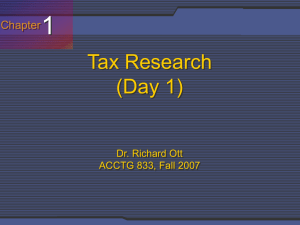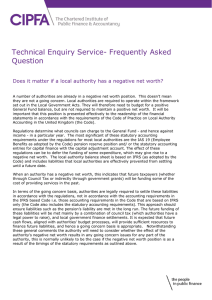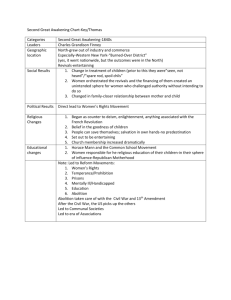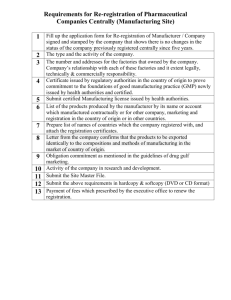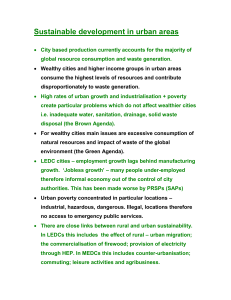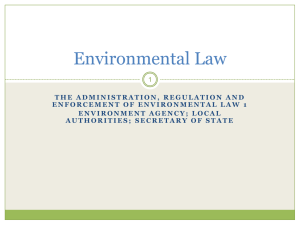An innovative country with a global outlook
advertisement
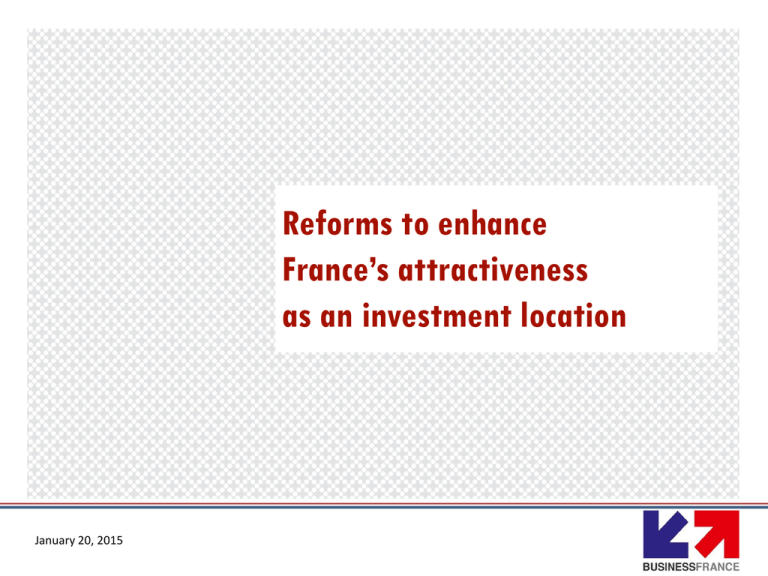
Reforms to enhance France’s attractiveness as an investment location January 20, 2015 An innovative country with a global outlook Promotion of France’s digital economy and incentives for research and innovation High-Speed Broadband France Plan to ensure coverage throughout the entire country. “La French Tech”, a major initiative to stimulate France’s most vibrant regional ecosystems and support the growth of their start-ups and digital companies. France’s research tax credit is the most attractive tax incentive program of its kind in Europe: a corporate tax break amounting to 30% of annual R&D expenses, up to €100 million, and 5% above this threshold. Further roll-out of work-study contracts in higher education: target to double the number of students enrolled in such programs by 2020 (Higher Education and Research Act, 2013) “National Investment Program” (€47 billion) supporting growth in strategic priority sectors. Business France, a new agency formed through the merger of the Invest in France Agency and UBIFRANCE to support the international development of the French economy. A labor market tailored to the needs of companies and employees Lower labor costs and employment law deregulation Thanks to the competitiveness and employment tax credit (CICE), businesses in France can obtain a corporate tax deduction of up to 6% of gross payroll costs. Abolition of employer social security contributions for employees earning the statutory national minimum wage, and lower family contributions for employees earning up to 1.8 times the statutory national minimum wage. New Employment Act passed and major employment round tables, responding to the needs of companies to adjust output, to enhance social dialogue, and to improve the performance of the French labor market. Job security agreements introduced in 2013, introducing greater flexibility for employers to adjust working hours and employee pay over a two-year period during an economic downturn. Overhaul to simplify collective layoff procedures (2013) and encourage mediation: shorter timeframes, and marked decrease in litigation. A modern tax system to encourage enterprise Progressively lower rates, abolition of certain taxes, and better information Corporate tax is to fall starting in 2017 to a standard rate of 28% by 2020. The exceptional corporate tax contribution will be abolished in 2016, while the so-called “75%” tax on incomes over €1 million has already been abolished (January 2015). Advance tax rulings expanded, and introduction in 2014 of the Tax4Business service (single contact point) enabling foreign investors to set up and do business in France in a clear and secure legal framework. This clearer and more secure legal framework includes the Charter concerning non-retroactivity for tax issues (January 2015), meaning that changes to taxation law will no longer affect the current or previous financial years. Streamlined customs procedures: reversal of VAT liability on imports (January 2015) on turnover declarations. A simplified business environment Hundreds of measures to simplify administrative procedures have already been introduced, with an ongoing program of new measures every six months. “Tell us just once” initiative (September 2013), a synchronized directory of all the information requested from companies to eliminate the need for companies to repeatedly provide the same information to different authorities. Tacit agreement: In the absence of a response from the authorities in a given timeframe, company requests will be automatically approved for a wide range of procedures. Nationwide overhaul of the structure of regional and local authorities to create a simpler, more coherent interface with government.
